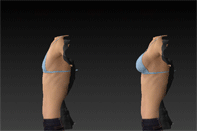We all know that smoking is bad for your health, but can it cause more issues if you plan on having plastic surgery? That’s one of the questions we get asked a lot here at the office from people who smoke on a regular basis.
Smoking cigarettes for a long period of time can cause major health related issues ranging from lung and heart issues, to increased risk for stroke, and cancer. These alone should be good reasons for you to give up smoking, but of course it’s not always that easy. We understand that smoking is a habit that adults can choose to pick up, and we understand that it’s hard to stop, but when it comes to plastic surgery, what the recommendations?
Surgery and Smoking
It is almost always recommended that whenever surgery is going to be performed, that the recipient refrains from smoking as soon as possible. The longer you go without smoking before your surgery, the better your chances are of not running into possible serious complications.
And this applies to general surgery as well as plastic surgery.
As we mentioned above, smoking can cause major health problems with your heart, brain, lungs, and just your body in general, so reducing your smoking will immediately help your overall health.
If you plan to have any type of surgery in the future, then being in the best possible shape will help cut back on the risks involved with those surgeries. And it will also help you to heal and recover more quickly.
So what exactly can happen to a heavy smoker that refuses to quit before their surgery?
- Higher risk of heart attack and strokes
- Higher risk of blood clots and pneumonia
- Higher possibility of death
In addition to these side effects that could come as a result of smoking while undergoing a surgical procedure, there are also things that can happen during and after the surgery that can make things more uncomfortable for you and the doctors.
1. Incisions Take Longer to Heal
Because smoking brings carbon monoxide into the body, it takes away oxygen from the cells needed to help the healing process. This can cause more toxins to appear in the blood, which can lead to a higher risk of infection.
Even if you were to quit smoking a week before the surgery, that will still allow some of that carbon monoxide to be removed from your system, and allow your cells to retain more oxygen, which will help during the recovery process.
2. Can Cause Issues with Anesthesia
When we’re talking about anesthesia and complications because of smoking, we’re mainly talking about general anesthesia and not localized numbing.
When you’re placed under general anesthesia, being “put to sleep”, an anesthesiologist has to monitor you and make sure that you don’t wake up during the surgery and that you stay properly sedated without complications.
One of the complications that come from heavy smokers under anesthesia is that the doctors have to work harder to ensure that you continue to breath. If your lungs are already damaged from smoking, or you have emphysema, you may not have the lung capacity of a typical person, which will require closer monitoring and adjustments throughout the process. It could also cause you to need unnecessary medication to help with the breathing while sedated.
It’s just one more complication that the doctors shouldn’t need to worry about while performing your surgery.
3. Increases Inflammation and Pain
Aside from complications, the one thing that most people worry about when undergoing a surgical procedure is the amount of pain they are going to be in once the surgery is complete. During recovery, pain medication can be used to help mitigate and control the pain from the surgery, but everyone’s body responds different to pain and pain medication. What may work for one person, may not work for the next, and smoking can increase the way you experience pain.
Cigarettes contain a number of chemicals that are inherently toxic when inhaled, but some of these chemicals can cause inflammation and/or swelling throughout your body. Because of this extra swelling that can occur, it can lead to smokers experiencing more pain than those patients that don’t smoke.
This is another good reason to forgo the cigarettes before having any type of surgery, especially if you don’t do well with pain.
Overall it’s just a smart decision to quit smoking, whether you plan to have a surgical procedure or not, but when it comes to surgery, non-smokers run far less risks of complications, pain, and other issues arising during and after the procedure.
If you’ve been looking for an excuse to quit, and you have a surgical procedure coming up, this is a great opportunity to follow through with that goal. Your body will thank you for it, and your doctors will thank you as well.
Even if you quit smoking the week of your surgery, the added oxygen getting into your system could be enough to prevent you from having serious complications that you may have otherwise experienced. And unfortunately it’s hard to predict what sort of complications may arise while you’re under general anesthesia, as a smoker, so wouldn’t you rather be as pro-active as possible?

















